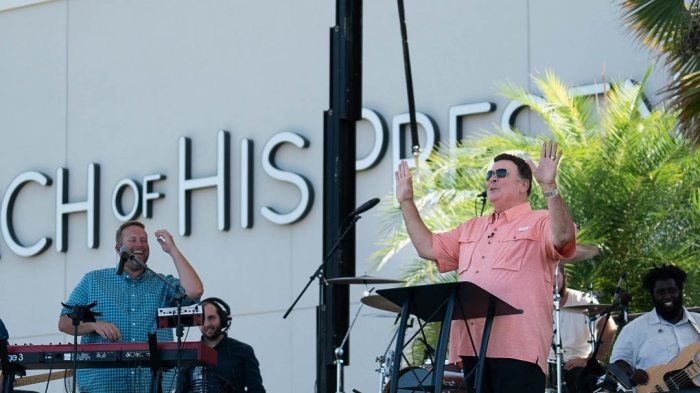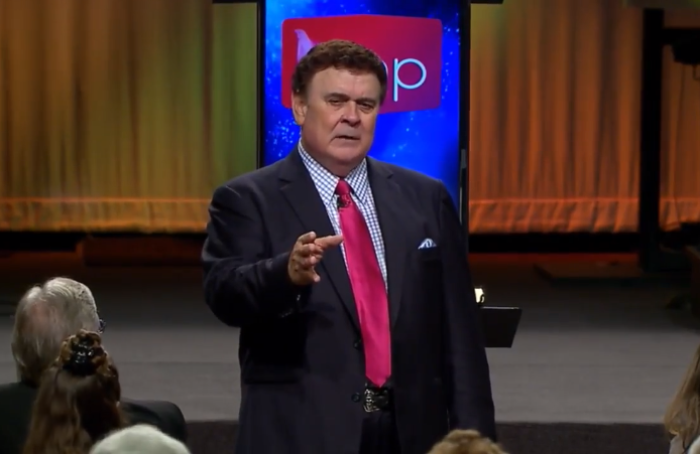Pastor who predicted end to Trump's presidency says God’s going to 'reimburse' black Americans

Despite opposition among some conservatives to the idea of reparations for slavery, the Rev. John A. Kilpatrick, a self-styled Assemblies of God prophet in Alabama who predicted the end of Trump's presidency in 2018, also predicted that God is going to “reimburse” black Americans for their trouble and labor.
Kilpatrick, who leads the Church of His Presence in Daphne, Alabama, as well as John Kilpatrick Ministries, made the prediction in a viral video clip shared earlier this month by online personality Larry Reid.
The Alabama preacher told The Christian Post on Wednesday that the clip is at least two years old, roughly around the same time he predicted that former president Donald Trump wouldn't have a second term in office due to "witchcraft trying to take this country over" that he wouldn't be able to withstand.
“Now let me say something right quick. I think back on African American people in America. I think how they were taken against their wills, put in the belly of ships brought over here, beat, cussed. Many of them died in the guts of those ships, thrown overboard. They were pulled from families over there. You ain’t never heard a gut-wrenching song 'til you hear a black person sing one of those black negro spirituals," Kilpatrick said in the clip posted on March 1, before trying to sing “Nobody Knows the Trouble I’ve Seen.”
“When you experience hell it comes out of your voice. If you’re one of those people that you’ve got problems with black people or whatever, you better shut your mouth, ‘cause they’re God’s people, you better hear what I’m saying to you. Shut your mouth, you better shut your white mouth,” he told his audience.
“I know some of you [were] raised in the deep South, raised by prejudiced people, bigoted people, you better get that out of your system, get it out of your system. It’ll cause you to suffer right along with those masters. It’ll cause you to suffer right along with them. These are God’s people,” he warned before making his comments on reimbursement for black people.
“I know that there’s wicked in the white race and wicked in [the] black race, I’m not justifying none of that stuff. I’m just saying God knows what happened to the black race. He knows how they wound up over here and God is going to reimburse the black people for all their trouble and all their labor. You watch what I tell you,” he said.
Speaking with CP about the clip Wednesday, Kilpatrick explained that his comments about black Americans weren’t made as part of his planned message and weren't in response to any specific event at the time.
“It was just some comments that I made before I actually preached. … It wasn’t a sermon on that in particular. I just made the comments as I was addressing my congregation,” he said.
“I made those comments not because I was addressing any particular issue in my church, because it wasn’t necessary to do that. ... I was just making the statement that the black people in America have endured so much,” he said. “I was raised in the deep South. I was raised in Georgia and my playmates used to be black kids. And I loved them and they loved me. And I just don’t like to see anybody mistreated and anybody abused in any kind of way, and I was just making a statement that morning that I believe that God is going to remunerate and bless the black race because of all they’ve been deprived of.
When asked if he had reservations about upsetting his diverse but predominantly white church with his comments, he said that he wasn't and explained that his ministry is global and it was just something that needed to be said.
“My people are used to me being a straight shooter. I’m not a provocative person. I just try to shoot straight and just tell it like I believe that it is. And I just was talking to my congregation that morning and telling them that they really need to be careful. Everybody needs to be careful about the black race because they’ve gone through a lot,” he said.

Kilpatrick, who explained that he tries not to get political with issues, didn't elaborate on what that remuneration for black Americans would look like, but maintained that “I believe God is going to bless them and I believe God is going to send revival to the black race, and that’s the way I felt about it.”
While Kilpatrick didn't use the word reparations and shied away from politics in his response, his prediction about reimbursement to black Americans for their trouble and labor could be as accurate as his predictions on Trump's presidency.
On Wednesday, a House committee voted to recommend for the first time the creation of a commission to consider providing black Americans with reparations for slavery in the United States and a “national apology” for centuries of discrimination through a bill called H.R. 40, The New York Times reported.
The late Democratic Rep. John Conyers of Michigan, first proposed the bill to study reparations for black Americans in 1989 and every legislative session after that. The bill never reached the House floor for a vote to put it on a path to become law.
His Democratic colleague, Rep. Sheila Jackson Lee of Texas, continued his fight when she raised the issue of reparations in January 2019 by introducing bill H.R. 40, also known as the Commission to Study and Develop Reparations Proposals for African Americans Act.
In addition to providing reparations, the legislation "is intended to examine the institution of slavery in the [British] colonies and the United States from 1619 to the present," according to a press statement at the time.
Last May, three days before the death of George Floyd on May 25, and just months after Conyers’ death in October 2019, Lee paid homage to Conyers’ efforts in an op-ed on the bill for the ACLU.
“Though many thought it a lost cause, he believed that a day would come when our nation would need to account for the brutal mistreatment of African Americans during chattel slavery,” she wrote.
She then explained how H.R. 40 is not just about money but a path toward restorative justice.
“Though critics have argued that the idea of reparations is unworkable politically or financially, their focus on money misses the point of the H.R. 40 commission’s mandate. The goal of these historical investigations is to bring American society to a new reckoning with how our past affects the current conditions of African Americans and to make America a better place by helping the truly disadvantaged,” she said.
“Consequently, the reparations movement does not focus on payments to individuals, but to remedies that can be created in as many forms necessary to equitably address the many kinds of injuries sustained from chattel slavery and its continuing vestiges. To merely focus on finance is an empty gesture and betrays a lack of understanding of the depth of the unaddressed moral issues that continue to haunt this nation.”
During a committee debate Wednesday, Lee added: “We’re asking for people to understand the pain, the violence, the brutality, the chattel-ness of what we went through. And of course, we’re asking for harmony, reconciliation, reason to come together as Americans.”
While noting that he didn’t know enough about some of the more recent high-profile fatal police shootings of black men, like 20-year-old Daunte Wright in Minnesota, Kilpatrick said there is a spiritual component to the violence happening today.
“I can understand so much of the frustrations that they [black people] were going through," he said. "At the same time, I realize we’re living in a world filled with hatred and violence. That’s the way it is before the coming of the Lord.
"The Lord said one of the main things that filled the Earth in the days of Noah, He said, as it was in the days of Noah so shall it be in the days before the coming of the Son of Man. He said the Earth was filled with violence and I believe that violence is pervasive right now. I believe it’s filling the Earth. I really do. It’s not just a racial thing. It’s not just a black and white thing. This is just the spirit of violence that’s filling the Earth. And I believe that right before the coming of Christ, I believe that we’re close to that.”
He urged pastors to try speaking calm into tense situations such as on discussions on race as that is something that Christ would have done.
“I saw a commercial one time of a building supply company and it showed a major storm coming in. Big, deep, dark clouds, lightning, thunder, wind blowing. And it showed him [building supply company representative] at a stop sign and to the right was clear skies and to the left was a major storm. He cut his signal on, his turn signal on to the left and drove right into the storm.
“You know, a lot times the Lord has not called us to drive away from the storm, He’s called us to drive into the storm because that’s where your voice needs to be heard. People [are] not going to listen to your voice in clear skies. They’re going to need to listen to a preacher’s voice in the middle of the storm. And Jesus’ voice was raised in the midst of the storm,” he said.
“I think that preachers need to use their voices to calm the storm. Instead of stir up the storm. So we shouldn’t run from it, we should run to it. But when we get there, we need to ask ourselves the question: Is this storm going to get better or worse because of my voice? Am I going to have a calming effect on this? Am I going to bring order out of disorder or am I going to bring disorder out of order?” he continued. “I do know that pastors, if they’re called by God, God gives them wisdom to deal with situations and wisdom has to come from God, it can’t come from within. We can have knowledge, we can have intelligence, but God has to give wisdom and the Bible says, if any man lack wisdom, let him ask God.”
He further noted: “If we speak the Word of the Lord, it will deal with the political realm. It will deal with the racial issues, it will deal with everything that has to be dealt with, because the Word of God is a common denominator.”




























